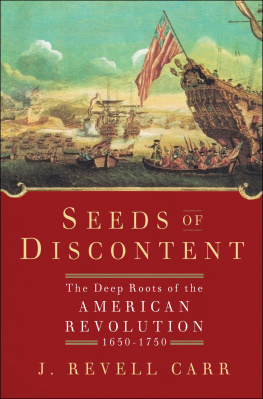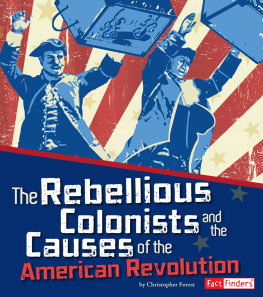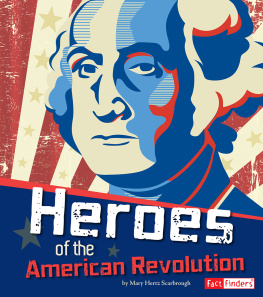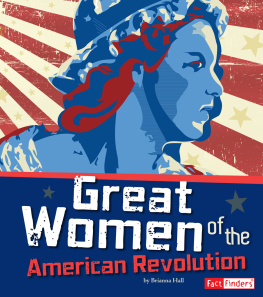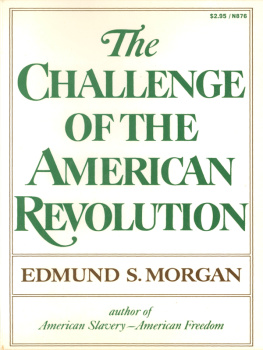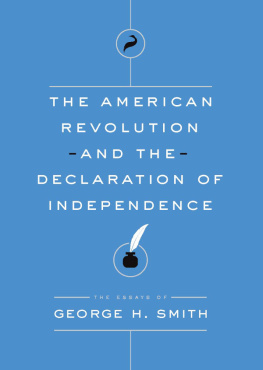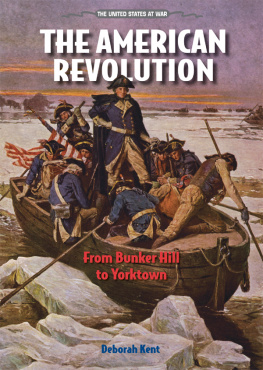Seeds of Discontent
All Brave Sailors
Seeds of
Discontent
THE DEEP ROOTS OF THE
AMERICAN REVOLUTION
1650-1750
J. Revell Carr

Copyright 2008 by J. Revell Carr
All rights reserved.
You may not copy, distribute, transmit, reproduce, or otherwise make available this publication (or any part of it) in any form, or by any means (including without limitation electronic, digital, optical, mechanical, photocopying, printing, recording, or otherwise), without the prior written permission of the publisher. Any person who does any unauthorized act in relation to this publication may be liable to criminal prosecution and civil claims for damages. For information address Bloomsbury USA, 1385 Broadway, New York, NY 10018.
Published by Bloomsbury USA, New York
Bloomsbury is a trademark of Bloomsbury Publishing Plc
LIBRARY OF CONGRESS CATALOGING-IN-PUBLICATION DATA HAS BEEN APPLIED FOR.
eISBN: 978-0-802-77761-4
First U.S. edition 2008
To find out more about our authors and books visit www.bloomsbury.com. Here you will find extracts, author interviews, details of forthcoming events and the option to sign up for our newsletters.
To my family, friends, and mentors, who, over nearly seven
decades, have encouraged and assisted me in my work.
Contents
A project such as this is the result of the efforts of many people over centuries. It could not have come together without the records left by diarists, journalists, archivists, and historians who created the record of those events of the past. They, many listed in the bibliography but many who remain anonymous, are owed a debt of gratitude.
In the present time, there are many organizations and people who have contributed to this book. B. A. (Sandy) Balcom and Kenneth Donnovan, historians at Fortress Louisbourg and the staff at the Louisbourg Institute of Parks Canada, were generous with their time and encouragement as this project took shape. At the American Antiquarian Society, Vincent Golden, John B. Hench, and Jaclyn Donovan were very helpful, as were Bill Fowler, Peter Drummey, and Rakashi Khetarpal of the Massachusetts Historical Society. I also want to specifically thank Gail Bretton and Denise Rankin at the Skidompha Library in Damariscotta, Maine; Don Simmons at the Firestone Library of Princeton University; Paul OPecko and the staff of Mystic Seaports G. W. Blunt White Library; Cathy Williamson of the Mariners Museum Library in Newport News, Virginia; George de Zwaan at the National Archives of Canada; Jennifer Kittlaus of George Washingtons Mount Vernon Estate and Gardens; and Holly Smith of the Bostonian Society.
The following institutions and their fine staff members contributed significantly to this effort: the National Archives in Kew in the United Kingdom; the Caird Library of the National Maritime Museum, Greenwich, United Kingdom; the Bowdoin College Library; the Massachusetts Archives; the Boston Public Library; the Houghton and Lamont Libraries of Harvard University; the New England Historic Genealogical Society; the Phillips Library of the Peabody Essex Museum; Historic Northampton; the Maine State Library; the Maine Historical Society; the Rhode Island Historical Society; the Connecticut Historical Society; the New York Public Library; the William L. Clements Library of the University of Michigan; the Mary land Historical Society; the Georgia Historical Society; the Mary land Archives; the Zimmerman Library of the University of New Mexico; the Meem Library of St. Johns College; and the Santa Fe Public Library.
I also want to thank Abby More of the Department of Romance Languages at Bowdoin College for her help in recruiting George S. MacLeod and Violaine Delmas, who did a superb job of translating La chute de Louisbourg, the journal of Gilles Lacroix-Girard.
At Walker & Company, I have received encouragement, support, patience, and friendship from publisher George Gibson, who also provided astute editorial guidance. My editor, Michele Lee Amundsen, cheerfully did a thorough job and spotted many flaws and excesses, which when addressed made for a better book. George and Michele have been a joy to work with, and the rest of the Walker & Company team has demonstrated its professionalism.
My agent, Stuart Krichevsky, and his colleagues at SK Literary Agency continue to be a steady source of encouragement and guidance. Stuart is attentive amid the fast pace of his successful firm. Kathryne Wick and Shana Cohen carry out their work efficiently and with good humor that makes working with them a pleasure.
Several friends have been of particular help in this effort. Ruth and Lawson Willard eased the strain of overseas research by providing the most comfortable of homes away from home during several trips. Their friendship over the years is cherished. Two other literary friends have been particularly supportive, Nat Philbrick and Jamie McGrath Morris of the E/TL&DS.
Final thanks go to my family. I could not be more proud of Rev, Geordie, Mieko, Lisa, Bud, Willow, and River or more thankful for their presence in my life. Special thanks go to Barbara, who worked tirelessly on the first edit of the manuscript and contributed significantly to this book.
J. Revell Carr
Santa Fe
For decades, the English colonists along the east coast of North America had been enduring the increasingly oppressive rule of English kings and their heavy-handed and sometimes light-fingered representatives in the colonies who strictly enforced repugnant policies and added to their personal wealth at the expense of the colonists. The liberties the colonists had cherished as Englishmen had been eroded. In Boston, English redcoats manned the cities fortifications and walked the streets to support the harsh governmental policies and suppress resistance. The Royal Navy was afloat in the harbor, adding its cannons to the intimidation. The people were enduring capricious taxation without representation. The tradition of electing a representative legislature had been suspended, and the charter of the colony, its constitution, had been revoked. Free trade and commerce that had enabled Massachusetts and the other colonies to gain financial strength was being impeded and manipulated by Navigation Acts that favored the Crown and promoted the steady flow of income to the royal purse at the expense of colonial merchants and mariners.
These conditions extended to all the northern colonies, including Maine, Massachusetts, New Hampshire, the Plymouth Colony, Rhode Island, Connecticut, New York, and East and West Jersey. Similar frustrations existed in Maryland, Virginia, and the Carolinas farther south. However, it was in Boston that the seeds of discontent had been firmly planted, and it was in Boston where the colonists and the redcoats would first meet, gun barrel to gun barrel. When the tinderbox ignited in Boston, the flames of what would become a successful revolution spread quickly down the coast and engulfed all of Englands colonies.
Remarkably, the year was not 1775 but 1689, and the hated king was not George III but James II.
The conditions in Englands American colonies in the seventeenth century had deteriorated to the point that the colonists felt compelled to risk their lives in an attempt to right the wrongs they had endured and regain the freedoms they had enjoyed for decades. During a period of benign neglect in the first half of the seventeenth century, the nascent colonies established themselves and set up their own governance under the charters they had been granted or the guidance of colonial proprietors. With the English kings and Parliament preoccupied with more immediate issues at home, the colonies were left to struggle on their own and in the process developed a strong sense of independence. The political ordeal for the colonists began with the first of the Navigation Acts, which was imposed during the Interregnum and increased significantly after the Restoration of the Stuarts to the English throne in 1660. In the decades that followed, the increasingly onerous impositions of the Crown created deep resentment that led to revolution in the spring of 1689.
Next page
